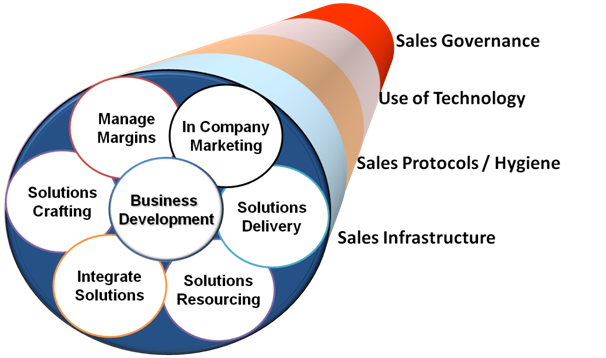
It doesn’t take much to sow the seeds of discontent in business today, and the potential for creating dysfunctional, “toxic” sales teams and culture is much easier than you think. There are so many things that can and do go wrong.
We at Barrett have met and worked with a great many sales teams across all sorts of industries over the years. In all honesty, we are yet to come across the ‘perfect’ sales team. That doesn’t mean to say that there aren’t great sales teams operating out there, because they do exist, but like every great team, their greatest can ebb and flow. Just think of sports teams and their fluctuations towards greatness or loser status.
 Creating and keeping a healthy, productive and vibrant sales culture, just like a great sports team, requires constant vigilance. Besides getting the right athletes, facilities, training and medical staff, how much effort is also being put into creating the right kind of club and team culture in the sporting world to ensure success and greatness? Just think ‘leadership team’, values, ethics, and the right character qualities.
Creating and keeping a healthy, productive and vibrant sales culture, just like a great sports team, requires constant vigilance. Besides getting the right athletes, facilities, training and medical staff, how much effort is also being put into creating the right kind of club and team culture in the sporting world to ensure success and greatness? Just think ‘leadership team’, values, ethics, and the right character qualities.
Selling is not an exact science – there are just too many variables at play (markets, products, competitors, customers, production, customer service and marketing, to name a few) any of which could easily shift and change levels of success overnight. In all of this, defining the right kind of leadership, culture and sales infrastructure is critical to a healthy sales teams culture.
Leadership & Culture
Keeping a handle on the best way to lead and manage a sales team and create a vibrant sales culture is often a very tough job. However, it always starts and ends with clear, strong, decisive ‘adult focused’ leadership from the top – not just from the sales manager(s). Paul Roos, the former Coach of the AFL Sydney Swans and 2005 Australian Sports Coach of the Year is one of Australia’s most admired sporting personalities whose leadership skills, ethics and philosophy transformed the way he, his coaches and the players approached their work as an elite football team with great success. Like the Sydney Swans, the Geelong Football Club followed similar lines, and these two AFL football teams have been at or near the top of the competition for the last decade and have 5 premierships between them to prove it. Taking a ‘complete’ or holistic focus with a culture of strong leadership, respect, humility, team, underpinned by clear values, desired character traits and proper infrastructure is central to their cause.
Great business leaders respect selling, whether they, themselves, have been selling directly or not. They ensure that there is a moral compass guiding their actions and a higher purpose beyond profit that steadies their ship.
Sales Infrastructure
The business leader and/or leadership group also know that sales can be messy so they make sure that the key foundations or sales infrastructure is in place so whatever happens they have something specific to refer to make conscious adjustments as changes invariably occur. The Sales Atom is an illustration of what a robust sales organisation should contain, allowing leaders and their sales teams to optimise the primary activities of sales, in a highly customer-centric sales support structure.
The Sales Atom:
Without such a sales infrastructure and a moral compass in place, toxicity can take hold and then things start to fall apart often with tragic consequences. Sadly, over the years we have borne witness to some really ugly sales teams and cultures. Thankfully, not too many but enough to know they do exist. These toxic sales teams turn up, more often than not, in industries that have low barriers to entry and where no real expertise or applied knowledge is required of the sales people. These companies and industries often have little or no respect for formal education, a distinct lack of customer centricity and are ‘profit only’ motivated often at the expense of their customers and staff. This often leads to less than respectable reputations for integrity, ethics, transparency, customer centricity and offering genuine value.
Examples of Toxic Sales Teams
Here are two extreme examples of highly dysfunctional, toxic sales teams and cultures that create very poor customer experiences and as well as wreak havoc in companies and across industries:
1. The Wild West Sales Cowboy Culture:
- no clear boundaries, guidelines or standards about how we sell around here
- no moral or ethical guidelines in which to operate so everything is up for grabs; sales people and managers can say or do what they want… lie and cheat the customers and each other to get a deal
- a climate of gossip, personal attacks, yelling, sniping, and undermining when things don’t go right or the market is tight or whenever they feel like it.
- sales leadership is either nonexistent or so loose that no coaching of any kind occurs and, instead, sales managers bark orders at sales people telling them what to do.
- leadership (if you can call it that) creates and operates a climate of fear, keeping salespeople anxious about their jobs security, never giving constructive feedback or anything useful to make effective change. Bullying is their preferred strategy for change. They want ‘hungry’ desperate people (you know the huge mortgage, children, living on a knifes edge, etc.) because they will perform, won’t they? Sure but for how long?
- The sales environment is made to be overly competitive – internally. Salespeople are pitted against each other, sales territory lines are blurred and this creates a climate where everyone is out for themselves; taking leads from other salespeople, justifying their actions, poaching clients, etc. Bloody battles may ensure and sales lives can be easily lost.
- Often the salespeople earn most of their money via commissions with little or no base salary to give them earning stability which can lead to desperate people doing desperate things, especially when times are tough.
- It’s all about the results, the numbers, how much money is coming in and nothing else. Nothing about how you got business, how well you sold, nothing constructive or tangible at all.
- The leaders, and less so, their salespeople can come across charming at first but you often find there is an undercurrent self absorbed narcissism where the sales leaders have a high attraction rate of new sales staff but a low retention rate because when people find out what is really going on they leave fast. Sales managers are nothing more than ‘super salespeople’ who see their sales people as a means to an end i.e. a means to their big fat bonus and often take over the sales call to get the deal at the expense of teaching and coaching their people. ‘It’s all about me’ Is what you see.
At the other end of the spectrum we have:
2. The Totalitarian Sales Robot Culture:
- Micromanagement on scale never seen before. These sales cultures often reside in ‘call centre’ environments where process is mapped and everything must either be timed, recorded, ticked or measured in such micro detail that no space is given for salespeople to manage the ambiguities that inevitably come with human interactions.
- Everything is scripted within an inch of its life taking any human interaction out of the equation and turning salespeople into robots.
- People are frightened to stray outside of the rigid structure leaving customers frustrated because no one can solve their problems. Passed from one level to another, customers can often be lost in a maze of indecision and buck passing.
- Managers are just that: managers. They are obsessed with managing process and numbers do no lead, coach or inspire their teams.
- There is no respect for salespeople’s time and personal requirements: they are seen as galley slaves where even their toilet and lunch breaks are counted and timed and penalties administered if they are late.
- Salespeople are kept on a tight leash and cannot use their initiative or problem solving skills to create better solutions even if they wanted to. Instead, as customers, we are met with resistance and rigidity and sometimes outbursts of anger.
- Sales managers or team leaders are often patronizing, policing agents hell bent on control and power – no room for people.
- Humanity is ignored and people are bored in this joyless environment.
- These sales cultures are the equivalent of factory sweat shops.
Where does all this toxicity lead to?
- High turnover of staff
- A culture of blame and denial
- Dissatisfied customers
- Unhappy, disengaged staff
- Poor sales results
- Poor reputation which further impairs the recruitment of new staff
- And more…
A fish rots from the head down – a toxic sales culture is definitely a leadership issue. You might occasionally, inadvertently hire a 600lb sales gorilla who can wreak havoc however, a toxic or healthy sales culture and team is entirely a reflection of senior leadership.
So do you do you want your business and your sales team to be the place where people have their sales careers destroyed or a place where people can launch or evolve their sales careers?
The choice is yours.
Remember everybody lives by selling something.
Author: Sue Barrett, www.barrett.com.au



New Article Email Notification